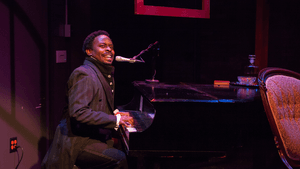Stay in the Loop
BSR publishes on a weekly schedule, with an email newsletter every Wednesday and Thursday morning. There’s no paywall, and subscribing is always free.
Pass the laudanum
Orbiter 3's world premiere of Sam Henderson's 'The Brownings'

Sam Henderson’s The Brownings — the sixth world-premiere production from playwriting collective Orbiter 3 — offers a rollicking, occasionally funny, frequently heavy-handed portrait of one of poetry’s greatest and most troubled couples. Although a shell of truth surrounds his conception of Robert and Elizabeth Barrett Browning’s difficult married life in Italy, Henderson uses the pair to explore a battery of universal themes, including addiction, mental illness, toxic romance, artistic rivalry, and codependency.
Henderson flirts with these weighty issues, and occasionally mines a moment of emotional clarity to devastating effect. But more often, he takes the path of least resistance straight into a cheap laugh. The Brownings longs to be profound but settles for merely clever.
One needn’t be well-versed in the lives of the historical Brownings to find their way into Henderson’s world. Robert (David Ingram) and Elizabeth (Charlotte Northeast) act as avatars more than flesh-and-blood people, and I sensed that virtually any literary couple could stand in for them, and for the composer Robert Schumann (James Ijames, brimming with impish charm), who tickles the ivories like a 19th-century lounge lizard. Had Henderson picked up Ariel instead of Sonnets for the Portuguese, we might be watching a play about Sylvia Plath, Ted Hughes, and Benjamin Britten.
Still, Robert and Elizabeth offer fairly fertile ground for dramatic exploration. After a lifetime of ill health, Elizabeth spent her final years hopelessly addicted to laudanum, which she called “my amreeta draught, my elixir.” Compared to his wife, Robert found his talent inadequate; he largely stopped writing during their marriage.
Northeast seizes on this, turning Elizabeth into a swaggering bully who taunts her husband for his lack of ability. In one of the play’s best scenes, Elizabeth challenges Robert to a “sonnet-off”; the result is both hilarious and heartbreaking, as Robert crumbles up his middling verse, aware he will never match his wife’s talent.
For better, for worse
But Robert excelled as a caregiver, and some of the drama’s most genuinely moving moments come when we see him nurture Elizabeth through her difficult final years. (She died in 1861, at 55; Robert outlived her by nearly 30 years.) Ingram and Northeast bring a quiet sadness to Elizabeth’s death scene, punctuated by her gently whispered refrain, “I’m tired.” After experiencing the high-octane version of this couple, the tonal shift feels truly unsettling in a satisfying way.
Despite these contained moments of brilliance — and Harriet Power’s assured, detail-oriented direction — The Brownings never quite coalesces. Henderson introduces his themes pell-mell, and the play’s short scenes often highlight how little substance underpins the witty dialogue and gratuitous use of anachronistic profanity.
After about the fifth potentially interesting subject — perhaps Schumann’s assertion that only music can be the true Weltsprache, or universal language — was glossed in favor of some tongue-in-cheek quip, I felt like I was watching second-rate sketch comedy. Everything acted as a setup for the lady in the funny dress to say “fuck” a lot.
It’s funny, sure. And Henderson has undeniable talent. But, to employ the play’s vernacular, what the fuck is the point?
What, When, Where
The Brownings. By Sam Henderson, Harriet Power directed. Orbiter 3. Through December 9, 2017, at FringeArts, 140 N. Columbus Boulevard, Philadelphia. (215) 413-9006 or orbiter3.org.
Sign up for our newsletter
All of the week's new articles, all in one place. Sign up for the free weekly BSR newsletters, and don't miss a conversation.
 Cameron Kelsall
Cameron Kelsall